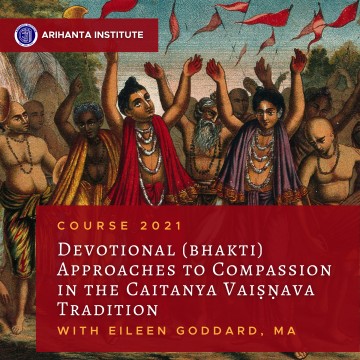Devotional (bhakti) Approaches to Compassion in the Caitanya Vaiṣṇava Tradition
Course Intro Video


Devotional (bhakti) Approaches to Compassion in the Caitanya Vaiṣṇava Tradition
Course 2021
In Vaiṣṇava devotional (bhakti) traditions inspired by the ecstatic figure Caitanya (1486-1533) from Bengal, central importance is attributed to the loving relationship that each practitioner develops with the supreme Godhead Kṛṣṇa. And yet, such traditions also demonstrate that the foundational love that each practitioner cultivates for the divine must also extend towards other human beings (jīvas). This course begins with analyses of the sixteenth century Gauḍīya Vaiṣṇava tradition’s early development of Caitanya Vaiṣṇava cosmologies, philosophies, principles, practices, and communities. Such analyses highlight how recognizing Kṛṣṇa’s divine presence in other jīvas is the foundation of all love for other embodied beings, such that compassion (kṛpā) functions as an extension of one’s love for Kṛṣṇa. The course explores how community-building, an egalitarian worldview, and the ethic of humility intersect in Caitanya Vaiṣṇava compassion from the sixteenth to twenty-first century. It ultimately highlights how bhakti traditions, although centrally concerned with love for the divine, also remain concerned with extending love and compassion to other human beings.
Course materials include a variety of readings that will be provided throughout the course.
Learning Objectives
By the end of this course, students will be able to:
- Understand how Caitanya Vaiṣṇava cosmology and philosophy inform ethical ideals.
- Understand how the centralizing principle of devotion (bhakti) expands from love of the divine to love for other human beings.
- Learn how Caitanya Vaiṣṇava principles have been translated into a range of compassionate humanitarian actions.
Course Length
Available for self-study on Monday, October 6, 2025.Course Details
4 hours Self-Study (Professor available by appointment in office hours)This course is offered by the Compassion Studies Initiative at Arihanta Institute and has been made possible through the generous support of the Uberoi Foundation.
Image Credit: Devotees of Krishna and followers of Sri Caitanya, dancing with drums, flags and narsingh horn. Chromolithograph. Wellcome Collection. Source: Wellcome Collection.
Learning Area
 Social Justice
Social Justice Instructor
 Eileen Goddard
Eileen Goddard
Eileen Goddard is a Religious Studies Ph.D. Candidate at the University of California, Santa Barbara. She teaches courses on Indian religious traditions and philosophies at UCSB and the University of Houston. Eileen's dissertation research focuses on the sixteenth century Gauḍīya Vaiṣṇava tradition and comparatively analyzes Indian soteriologies of perfected minds and bodies. Eileen's broader research interests include Hindu and Indian philosophies, bhakti traditions, classical Sanskrit aesthetic theory (rasa), and gender and sexuality. Eileen completed her M.A. in Religion at Rutgers University and B.A. in Philosophy at The University of North Carolina at Chapel Hill.
Enrollment Options
14-DAY FREE TRIAL
- Free, unlimited access to our self-paced courses for 14-days.
- Already used your free trial? Enroll in our Monthly or Annual Membership options at anytime and continue learning immediately!
MONTHLY MEMBERSHIP
- $45 USD / Month
-
Immediate access to course
#### | Name. - Unlimited access to our live and self-paced courses for one month, with month-to-month auto rollover.
- Excludes graduate seminars, language courses, and courses hosted on partner platforms.

